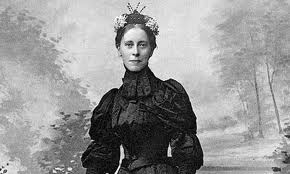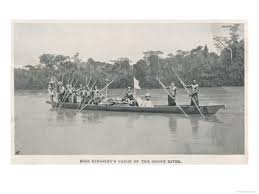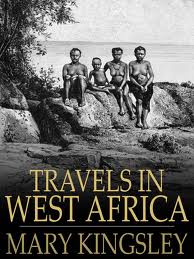
Mary Henrietta Kingsley lived in a state of suffocating Victorian restriction, a dutiful daughter caring for her ailing parents. And then, both parents died suddenly. With that, she set off to Africa for no better reason than her anthropologist father had never been there.
Representing herself as a trader, she laid in a supply of tobacco, fishhooks and other items she thought might be useful to those she encountered. Arriving in the Congo, she enlisted an entourage from the cannibalistic Fort tribe to escort her as she walked and paddled north. Dressed in trekking clothes of long, black, English skirt, with a high-necked blouse, cummerbund and closely fitted hat, when emerging from the bush to approach a settlement she’d call out reassuringly “It’s only me!”
She returned to England with crates of specimens and enough anthropological knowledge to address the London Society of Medicine for Women with a talk titled, “Therapeutics from the point of view of an African witch doctor.”
The next year she was back in Africa, again with no qualms about choosing a cannibalistic, tribal escort. Writing home with an account of paddling through mangrove swamps, she wrote: “On one occasion, a crocodile chose to get his front paws over the stem of my canoe and endeavored to improve our acquaintance. I had to fetch him a good clip on the snout with my paddle.”

Of an overnight stay in a native hut, she reported: “Never have I seen even in a picture book such a set of wild looking savages as those that night.” Adding that she asked for a cup of tea, and then gave one of her blouses to a naked soul who wore “nothing else but red paint and a bunch of leopard tails.”
One afternoon, while marching through the jungle, she dropped into a game pit, the bottom of which had been furnished with sharpened stakes. “It is at these times,” she observed, “that you realize the blessing of a good thick skirt.” Hoisted out of the pit, she continued along. Suddenly one of her entourage dropped from view with a despairing shock. Hoisted up, his wounds had to be bandaged with green leaves . “For he,” she wrote, “not having a skirt had got a good deal frayed at the edges.”

I can confidently say, ” she wrote, “that I am not afraid of any wild animal. Until I see it – and then – well, I will yield to nobody in terror.
She sailed down the Rembwe River in a canoe with a sail made from an old bed quilt; stopped in the Cameroons to climb West Africa’s highest peak, by its most difficult side. To do so, there were rivers to ford, mud and flies and thorns. With mud-caked skirts, scratched and bitten until her face and hands were bloody, she approached a trading station operated by a German, who was appalled by what came marching out of the brush – undoubtedly yoo-hooing, “ It’s only me.” He offered her a bath, which she declined. For how could she be expected to bathe in a house with inadequate shutters? “Men!” she lamented, “They can be so trying!”
